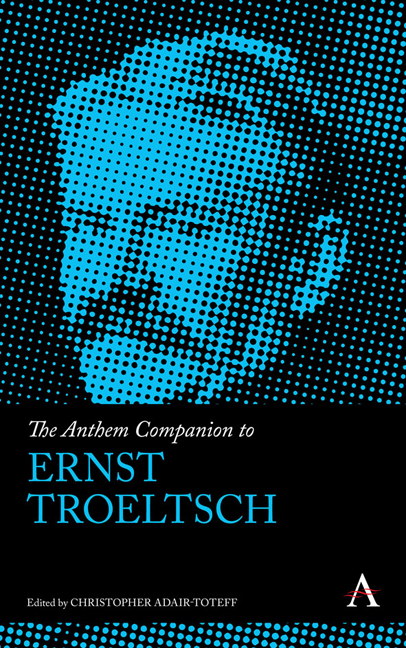Book contents
- Frontmatter
- Contents
- Introduction Ernst Troeltsch: Theologian, Sociologist, Philosopher, and Culture Critic
- Chapter One The Independence of Religious Phenomena: The Work of Ernst Troeltsch as a Template for the Study of Religion
- Chapter Two Troeltsch on Protestantism and Modernity
- Chapter Three Church, Sect, Mysticism: Writing the History of Christianity
- Chapter Four Troeltsch's Personalism
- Chapter Five Performative Practice: Ernst Troeltsch's Concept(s) of Christianity
- Chapter Six Troeltsch and the Problem of Theological Normativity
- Chapter Seven Troeltsch as Dogmatic Theologian
- Chapter Eight Ernst Troeltsch and the Problem of Historicism
- List of Contributors
- Index
Chapter Eight - Ernst Troeltsch and the Problem of Historicism
Published online by Cambridge University Press: 10 May 2018
- Frontmatter
- Contents
- Introduction Ernst Troeltsch: Theologian, Sociologist, Philosopher, and Culture Critic
- Chapter One The Independence of Religious Phenomena: The Work of Ernst Troeltsch as a Template for the Study of Religion
- Chapter Two Troeltsch on Protestantism and Modernity
- Chapter Three Church, Sect, Mysticism: Writing the History of Christianity
- Chapter Four Troeltsch's Personalism
- Chapter Five Performative Practice: Ernst Troeltsch's Concept(s) of Christianity
- Chapter Six Troeltsch and the Problem of Theological Normativity
- Chapter Seven Troeltsch as Dogmatic Theologian
- Chapter Eight Ernst Troeltsch and the Problem of Historicism
- List of Contributors
- Index
Summary
Introduction
In the Introduction to this volume it was asserted that Troeltsch was not just a theologian but also a philosopher and a political observer. In fact, he held professorships in two disciplines— first in theology and then in philosophy. In the early 1900s Troeltsch published a number of writings on two aspects of philosophy— the theory of knowledge and ethics. Later in the decade and into the next, he published on another part of philosophy, namely, the philosophy of law. He also wrote several works in the area of the history of philosophy, concentrating primarily on certain members of the rationalist school, like Gottfried Wilhelm Leibniz and Nicolas Malebranche, and on the English moralists, like John Locke and David Hume. But, Troeltsch's most extensive work was in the area of the philosophy of history, and his second massive book was devoted to this topic: Der Historismus und seine Probleme. If, as Austin Harrington has correctly observed, “Troeltsch has been a neglected figure in sociology” (2004: 479), then Troeltsch has been an even more neglected figure in philosophy. This chapter cannot cover Troeltsch's contributions to the various aspects of philosophy, but it can draw much- needed attention to his work in one important area— the philosophy of history. And, it will do so by concentrating on Der Historismus und seine Probleme. This chapter is divided into four sections. The first section offers a brief history of historicism; the second provides a lengthy examination of Historismus; the third is a discussion of Troeltsch's five lectures that he was to give in England; and the fourth is a survey of some the most important reviews of Troeltsch's books on historicism.
A Brief History of Historicism
“Historicism” is a term that is often difficult to define and that is often easy to criticize. This is not the place to catalogue the complaints against the concept, but it is the place in which to attempt to provide a definition. Historicism can be roughly defined as the belief that there is no grand abstract theory of historical occurrences but that “history” is seen differently by different cultures and ages. Or, as Troeltsch provisionally defines it in Historismus, “the fundamental historicizing of our knowing and thinking.”
- Type
- Chapter
- Information
- The Anthem Companion to Ernst Troeltsch , pp. 145 - 164Publisher: Anthem PressPrint publication year: 2017



